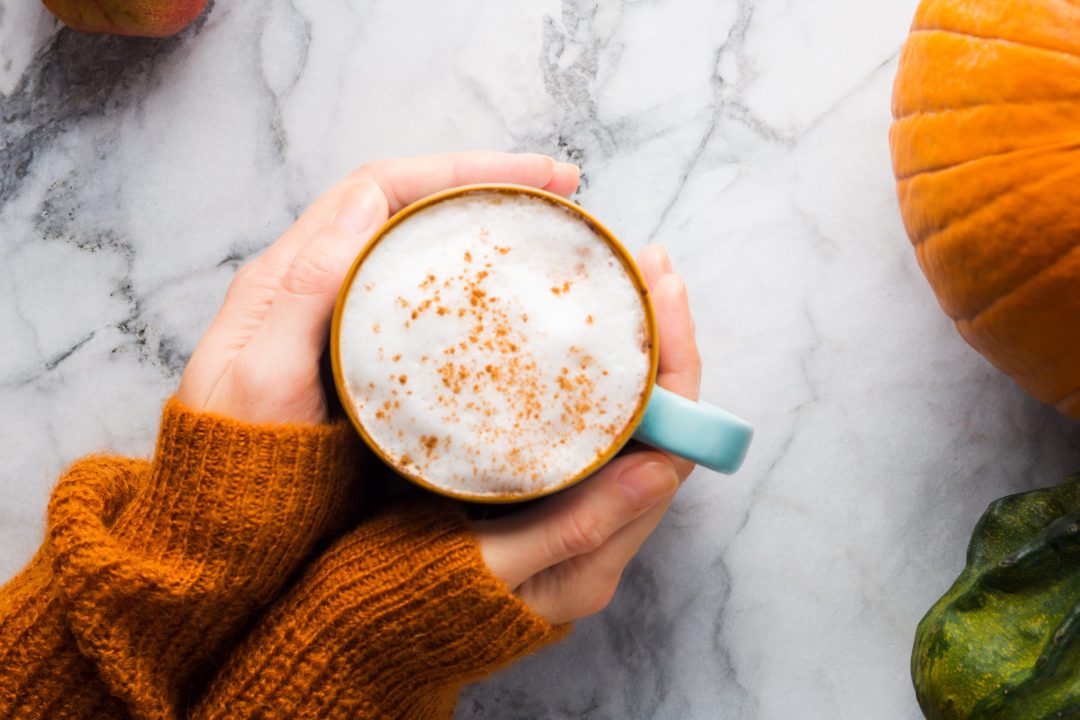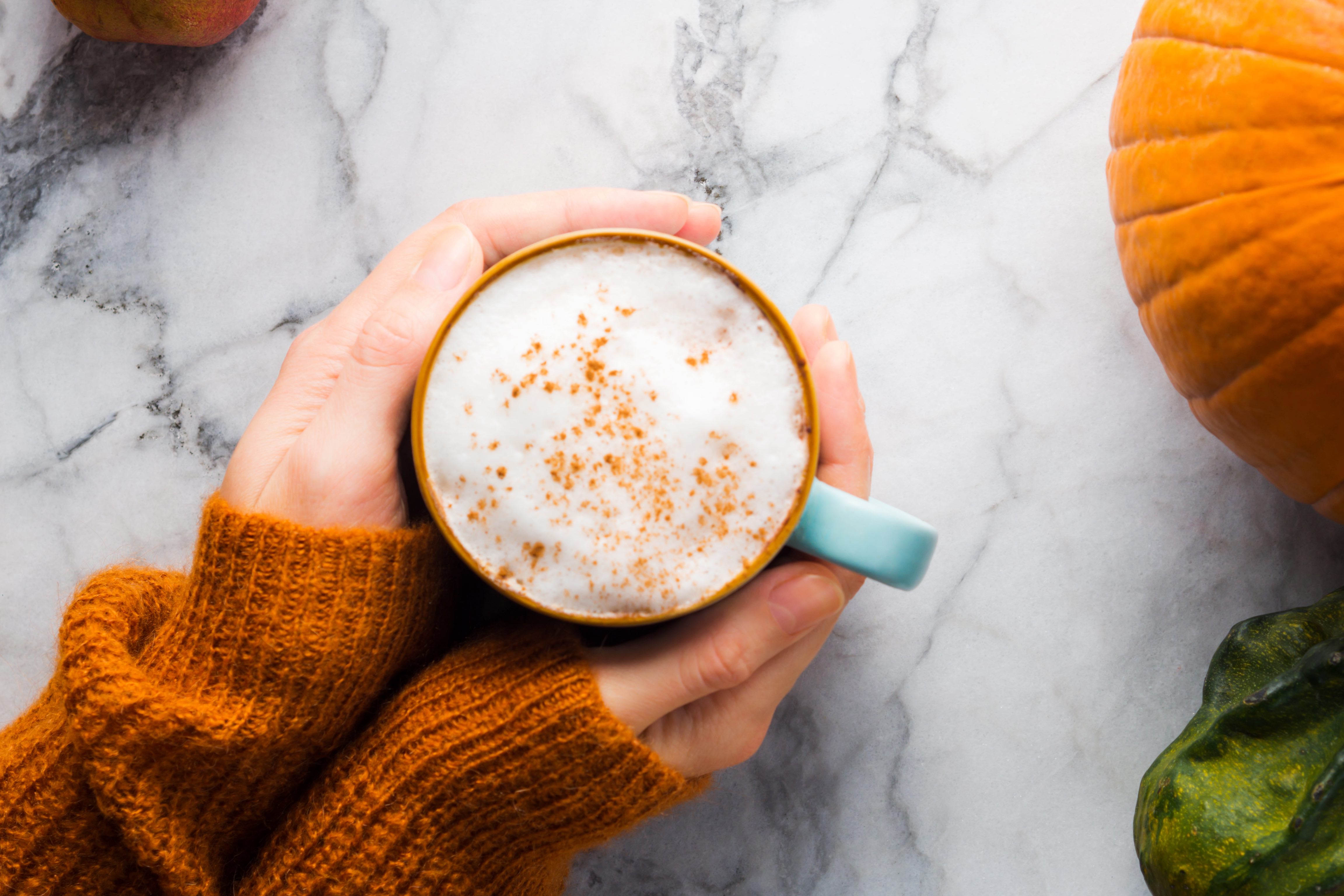I thought that maybe being in a wheelchair would stop my louche lunching ways, but somewhat to my own surprise (though not that of my mates, I’d wager), this isn’t the case. ‘You push – I’ll pay!’ has become my battle cry. But as I am wheeled about at this time of year, a pucker of irritation repeatedly flickers across my features. Pumpkin this, pumpkin that – all leading inevitably to the monstrosity that is pumpkin spiced latte.
The final straw in my deciding that pumpkin spiced lattes are utterly, well, deplorable was when the ghastly Hillary Clinton described herself as a fan – ‘until I saw how many calories there are in them’. Soz, Hills, but it’ll take more than losing a bit of weight to keep a dog like yours on the porch. That’s the point about pumpkins – they’re not chocolate, which makes people think: ‘Sod the calories!’ If they didn’t exist, nobody would have bothered to invent them. Where do pumpkins go for the rest of the year, when they aren’t being wheeled out to remind us that it’s autumn, grinning inanely? I can only think of one good thing about them, and that’s a joke they once inspired from me; when a young friend asked me if I’d ever sampled pumpkin soup, I replied instantly: ‘No – I don’t eat anything with a face.’ (For those who don’t know, this is a rather self-righteous vegetarian saying.)
What I would like to do is punch the next pumpkin face I see – and I’ve been seeing them for a long time now, as Halloween merchandise often hits the shelves in mid-summer. This year ‘Parade’ informed me that there’s now a thing called ‘Summerween’: ‘Summerween is a playful blend of summer vibes and Halloween thrills. Imagine sipping your favourite icy drink while surrounded by glowing pumpkins… it’s the best of both worlds! This quirky trend is catching on, giving Halloween enthusiasts an extra reason to celebrate and decorate months in advance. For some, it’s a specific day of celebrating Halloween early – usually on either 22 June or 31 July – but it could take place on any summer date.’
Give me strength! I like a nice portmanteau word, but this one made me want to hurl. Not least because in the midst of summer (the ultimate come-as-you-are/let-it-all-hang-out season – and precious little of it in Blighty) we’re being encouraged to get ‘cosy’ rather than revel in the golden rays from above. (Since I became disabled, I’m keener than ever on getting some Vitamin D on my haggard Halfling frame, at least the bits I can bear to bare.) And as if Halloween wasn’t keen enough on muscling in on summer’s short lease, the grim merch is still often on the shelves when the Christmas tat comes out, leading to the tasteless situation whereby demons jostle with merchandise celebrating the Prince of Peace.
I like all seasons; I’m lucky like that, or maybe I’m just not a moaner. But I’ve seen in recent years a homogeneity linking them which, I feel, stops us from celebrating them in their various raw glory. Specifically, I hate the emphasis on comfort which accompanies media suggestions for each season. Spring – clean your abode to within an inch of your life, lest lethal dust mites lurk with vile intent. Summer – lurk in your abode with the curtains closed whenever that scary golden disc in the sky shines bright, and stay hydrated. Winter – decorate your abode with emblems of a natural world which it’s too ‘miserable’ to actually go out into, and keep warm. But of course, as the clocks go back, it’s the current one, autumn, that’s the creme de la creme (or creme caramel) of the comfort-pedlars.
Of course only a fool would want to feel uncomfortable; since my bit of trouble I’ve been in active discomfort quite a lot of the time, and I wouldn’t recommend it to anyone. But we have historically managed our own discomfort, social, physical or otherwise, whether through educating ourselves or medicating ourselves. The modern emphasis on comfort – comfort eating, comfort dressing – reinforces the weird idea that contemporary life is uniquely ‘stressful’ – whereas no child’s been sent up a chimney in ages. ‘Stress’ is why healthy women feel the need to be regularly patted, petted and preened into a state of babyish beatification, battered by a century of ‘too much choice’ which has led to forced ‘juggling’ and foolishly trying to ‘have it all’. Just like Victorian maidens forever reaching for the smelling salts and fainting on to sofas when life got too much, today’s women are encouraged to reach for the aromatherapy and massage table. What did women do between the Victorian era and now without lavender oil to calm them down and ylang-ylang bath melts to get them in the mood for sex?
In your onesie, under your weighted blanket, engrossed in your adult colouring book, you’re just the way those who wield power want you
For some reason many of us now prefer to see ourselves – and be seen by others – as ‘fragile’ rather than resilient; you can see this in all the self-diagnosis of Mental Elf glitches, many of which apparently prevent people from doing a day’s work in an untaxing job. Of course this plays into the greasy mitts of politicians, who want nothing better than an infantilised electorate frantically mewing for The Adults To Be Back In The Room. (How’s that going, Starmer-voting clowns?) In your onesie, under your weighted blanket, engrossed in your adult colouring book, you’re just the way those who wield power want you – and here’s the concerned-sounding man on Radio 3, who you could once trust to be grown-ups, worrying that we might have experienced ‘anxiety’ today. Mind your own beeswax, you patronising blighter!
At least we appear to have freed ourselves from the hell of ‘hygge’, which Collins English Dictionary defined as the runner-up only to ‘Brexit’ as the word of the year in 2016 and which Wikipedia defines as ‘a word in Danish and Norwegian that describes a cosy, contented mood evoked by comfort and conviviality’. I was unfortunate enough to hear a repeat of the execrable Sandi Toksvig’s radio show on this very subject the other evening in which people who were supposedly her friends IRL visited her at some log cabin in the woods and had a lovely fun time. That was the theory – but I’ve honestly heard more joie de vivre in a spinal injuries unit. There was one good one right at the end, where Grayson Perry (after a parade of wearisomely un-funny state-sanctioned alleged comediennes such as Zoe Lyons and Bridget Christie) popped in, and he was just so spiky, defending British taste in art and slamming cosiness and damning lockdown. It’s amusing to think that ‘hygge’ was once used by certain people as a way to bash Brexit Britain – and now the Scandinavian countries are all going populist, sensible souls that they are, this has left them bereft.
The other day I was in a gorgeous restaurant with a new friend when suddenly the rains came down in theatrical proportions. But I didn’t find it anything as dull as ‘cosy’; on the contrary, the contrast was electrifying and elemental. It reminded me of a word I’m very keen on, and was introduced to by my late sister-in-law, the writer Charlotte Raven: ‘vivification’, which according to Merriam-Webster is ‘the act of giving life, vitality or vividness to something… to endow with life, animate or make more lively as vivid’. (Apparently the Sainted JKR has since used it in the Harry Potter books; she knows a winning word when she sees one.) In the recent Charlie Bigham’s survey which claims that couples prefer a cosy night in (though as a purveyor of pricy chilled fare to be consumed at home, he would say that, wouldn’t he?) to a catered night out, I would note that drinking alcohol, turning phones off, getting the kids out of the picture, gazing at the stars and ‘eye contact’ – which all featured in the top 20 – all seem to me far less about cosiness than connection. They say a marriage can’t survive contempt; I’d add too much cosiness to that too. So burn that onesie and let us seek the spark of vivification rather than the drear of comfort as the nights grow ever longer.








Comments